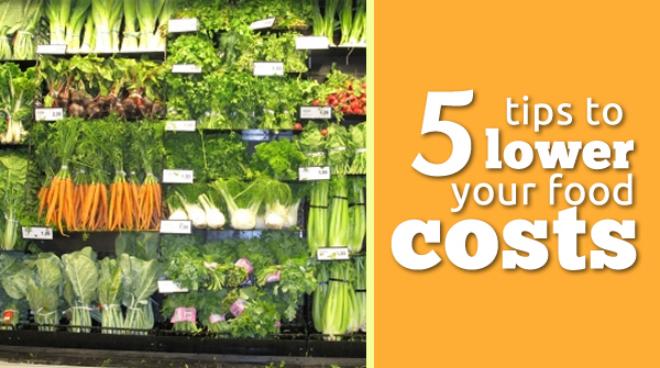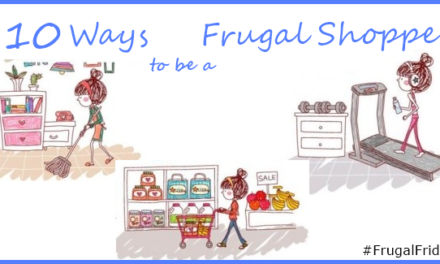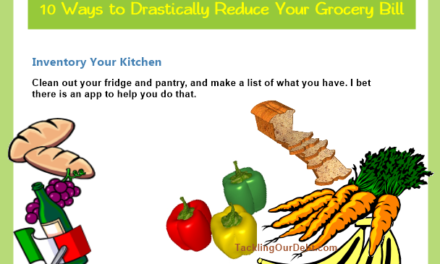Food is something everyone needs to survive and thus, we often feel less guilty when we exceed our grocery budget. This has long been a trouble spot for me, and I suspect for many others. My excuses ranged from it’s expensive to eat healthy to it was on sale so I had to buy it. Sound familiar? None of these excuses really hold-up to close scrutiny, so I finally decided to get my grocery budget under control, and it only took a few smart changes to lower my food costs.
Reduce Your Grocery Bill in 5 Easy Steps
It took some changes on my part but I eventually figured out that it doesn’t need to cost a small fortune to eat well or make delicious meals.
Even better, now that I stay within my grocery budget, I have more money to do other things, which is a win-win to me.
#1: Get Organized and Plan Your Meals
I basically used to do everything wrong. I would go to the grocery without a list or a game plan, wandering down the aisles and picking up whatever caught my fancy.
By the time I got home and emptied my bags, I had a weird assortment of groceries that really didn’t make any meals. Often times, this led to spoiled food, and my wastefulness embarrasses me today.
The answer to this problem was very simple: meal planning. Now I plan my meals in advance and go to the grocery store armed with my list. This keeps me focused, so miscellaneous items don’t end up in my cart.
Success Tip: Have a Few Cheap Recipes in Your Regular Meal Rotation
I’m not perfect, and sometimes my grocery budget at the end of the month is pretty bare bones. This is when I turn to my favorite cheap, but delicious meals to help me stay on budget.
Vegetarian meals, soups and pasta dishes are generally low-cost and can easily be stretched into multiple meals.
#2: Take Advantage of Sales Flyers, Coupons and Clearance Items
This works hand-in-hand with meal planning. I generally shop on the weekends and my store flyers run Tuesday to Tuesday, so this gives me a few days to go through them and plan my meals based on what’s on sale. It’s amazing how much of a difference it makes in my final bill.
And don’t forget to look for coupons that can be used with the store sale price to further increase your savings. This can make a huge difference.
While we tend to think of retail stores when it comes to clearance items, grocery stores have them too. Sometimes they are a bit hidden, and items may go quickly, so you need to know when and where your favorite grocery stores put their clearance items.
Every morning, one of my favorite stores puts heavily discounted prices on their perishables with imminent expiration dates.
A couple times a week, I walk to the store to see what’s on clearance, specifically looking for things that I can freeze such as bagels and meat. I generally avoid fresh produce as it needs to be eaten immediately and has an extremely short shelf-life by the time it reaches the clearance bin.
Success Tip: Keep a Checklist of Items You Need to Replenish
This checklist helps you know what staples you are running low on, such as cheese, eggs, flour, etc. Now you can quickly scan the store flyers to see if any of the items are on sale now or to clip coupons to save for when you do buy the item.
#3: Eat Seasonal Fruits and Vegetables
While it’s perfectly normal to crave an out-of-season fruit or vegetable, don’t waste your money tracking them down. You’ll pay a premium price for something pretty tasteless and bland. Whatever fruits and vegetables are in season taste the best and are the best value. If you have the equipment, consider canning and/or freezing fruits and vegetables at their peak, so you can enjoy them during their off-season.
#4: Plant a Garden, Join a Co-op, or Shop at a Farmer’s Market
More and more people want to eat organic food, but it does cost more, which can be hard when you are on a tight budget. Growing your own fruits and vegetables is one way to eat organic at a much lower cost.
If you don’t have a yard or the space, at least consider if there are few vegetables or herbs you can grow in planters on your patio or windowsill.
If a garden is out due to space, lighting or your thumb is more black than green (like mine), you may want to look into joining a co-op or shopping at your local farmer’s market.
Both can be another economical solution with the added bonus of getting amazing produce picked when they are ripe, not three weeks before.
If you shop at a local farmer’s market, go towards the end of day, when the merchants are more willing to negotiate and offer deals to get rid of their remaining produce. They want to sell it, not repack it.
#5: Turn Your Grocery Budget into a Challenge or Game
I love to do this and it really keeps me motivated to look for ways to lower costs. It feels so good when I come under budget. It just gives me a little boost. And I don’t sacrifice quality either. This game is what actually helped me embrace meal planning and stick with it.
And see the value of adding some cheap meals to offset the cost of more indulgent meals. When you make things you sometimes dread or avoid into a game, it can really make a difference and help turn it into a habit.





